In the past month, we saw for the first time, a major Iwi, Ngāti Toa announce their investment into one of New Zealand’s many geographically located data centres, while also a Trans-Tasman Indigenous regional edge datacentre provider Gambarra Kaha announced that they have expanded operations to New Zealand with a sole Māori Director.
Both announcements are a part of many recent announcements by Cloud Host Providers in New Zealand offering New Zealand and Māori sovereignty solutions. But it does highlight the crucial question “to what extent is this Māori Data Sovereignty” and is it good for all Māori and Iwi?
This article will do a deep dive analysis into the many Aotearoa New Zealand providers and self hosting solutions to ascertain to what level is Māori Data Sovereignty being offered. 5 Māori Data Sovereignty hosting options are identified that are available for Māori Data Sovereignty.
This article also discusses Māori and Iwi economic developments with Cloud Hosting providers and questions if fully sovereign cloud hosting is realistic, or if partnerships are more viable.
What is Māori Data and Māori Data Sovereignty?
He Raraunga Tino Rangatira
We respect Māori are an independent and sovereign nation that recognises Māori data is a taonga and subject to Māori governance.
Before this important discussion, we must address the issues of international cloud hosting companies and academics redefining and limiting for their own purposes, and a reflection of a lack of mātauranga (ancestorial knowledge) what these terms mean.
We need to use mātauranga Māori to understand Māori Data, that it is a taonga and what is sovereignty (defined in Te Tiriti and He Whakaputanga) as debated and agreed upon by mātauranga Māori experts such as Sir Hirini Mead who presided on the following hearing, expert witnesses such as Professor Jane Kelsey, Associate Professor Donna Cormack, Treaty stalwart Annette Sykes, Potaua Biasiny-Tule, myself and many others.
In the Waitangi Tribunal’s WAI 2522 Report on the Comprehensive and Progressive Agreement for Trans-Pacific Partnership (CPTPP) 2023 report, it found that:
Māori Data is
“Digital or digitisable information or knowledge that is about or from Māori people, language, culture, resources, or environments. Māori Data is a Taonga and subject to Māori Governance.“
And
“Māori Data Sovereignty is Māori Data Governance. The principles, structures, accountability mechanisms, legal instruments, and policies through which Māori exercise control over Māori data.”
Who is Gambarra Kaha
Is an indigenous collaboration building sovereign edge data centre infrastructure and cloud services, who according to their web site they
“are committed to fostering innovation, job creation, and economic growth across Australia, New Zealand, and the Pacific.”
They recently announced that they have established themselves in Aotearoa New Zealand. That company has a sole registered director who is Māori and affiliates to Ngāti Porou, Te Whānau ā Apanui and Ngāi Tahu making this a fully Māori owned Cloud hosting company.
Similar to the recent Tumu Paeroa Māori Data Sovereignty announcement, Gambarra Kaha also use Microsoft Azure and Azure Orbital, an integrated satellite ground station and scheduling service. The minimal jurisdictional risks and Māori Data Sovereignty are discussed here.
Ngāti Toa
Te Rūnanga o Ngāti Toa (Ngāti Toa iwi) one of the ten most asset rich post treaty settled Iwi announced that they have entered into an up to 33% (Companies Office at the time of writing states it is 15%) investment agreement in partnership with majority New Zealand owned Team IM a New Zealand hyperscale sovereign cloud service powered by Oracle Cloud .
This investment marks the first of its kind by a Māori organisation, which Ngāti Toa says is a move to invest in its people’s future by proactively participating in a sector that is rapidly transforming the way people live.
Helmut Modlik, Chief Executive at Te Rūnanga o Toa Rangatira says
“This investment aligns with our strategy to ‘paddle our own waka’ by providing a platform in Aotearoa that enables our sovereign kaitiakitanga. If we are to achieve our mission of enhancing the mana, well-being and prosperity of our people in the Digital era, then we need to be active participants in the sector that shapes almost every part of our society.“
Ian Rogers, CEO of TEAM IM says
“The partnership with Ngāti Toa allows TEAM Cloud to continue on its rapid trajectory as a New Zealand hyperscale sovereign cloud provider of choice for government agencies, Māori organisations and the wider private enterprise landscape.
According to the TEAM IM web site,
We emphasise data sovereignty as a core principle, ensuring that data stored in its cloud infrastructure is subject to New Zealand law and governance. As a locally owned and operated New Zealand based cloud service, data is physically located within New Zealand and governed by local laws. We also respect recognise the importance of managing data in ways that are consistent with Māori values and principles.
… are a locally owned company in Wellington that are focused on Māori/Indigenous Data Sovereignty and mention the Cloud Act in their Terms and Privacy.
What is Oracle Cloud?
Oracle state that their Oracle Cloud will (I do have to point out that their world map excludes New Zealand) https://www.oracle.com/nz/cloud):
Meet your governance, regulatory compliance, and data privacy requirements while experiencing the benefits of the public cloud in your own data centers. Enable applications and data to remain on-premises and adhere to data residency requirements.
Address AI sovereignty needs with OCI Dedicated Region. Deploy Oracle’s full AI stack in your data center for increased control of data and AI infrastructure.
Some critics will say The Cloud Act is the biggest risk because Oracle is an American company. Yes, Oracle is an American owned company and according to their web site they install and maintain the Cloud in various physical locations.
But, as I discussed in my previous post Jurisdictional Māori Data Sovereignty introduction the risks of the Cloud Act, external governments or law enforcement requests taking Māori Data or in fact any data are minimal.
Both New Zealand owned and American owned companies are still subject to multiple international laws and conventions. To note, The Cloud Act is used the least out of all avenues for law enforcement and governments to access with all Cloud Host providers.
Considering Team IM only started business this year, there are no details of requests for information under the Cloud Act, nor from other law enforcement agencies. But in a discussion with the company, they told me that this would be online at a future date and that as of September 13, 2024, there had been no requests.
Below are Oracle statistics of requests for data in the Asia Pacific region.
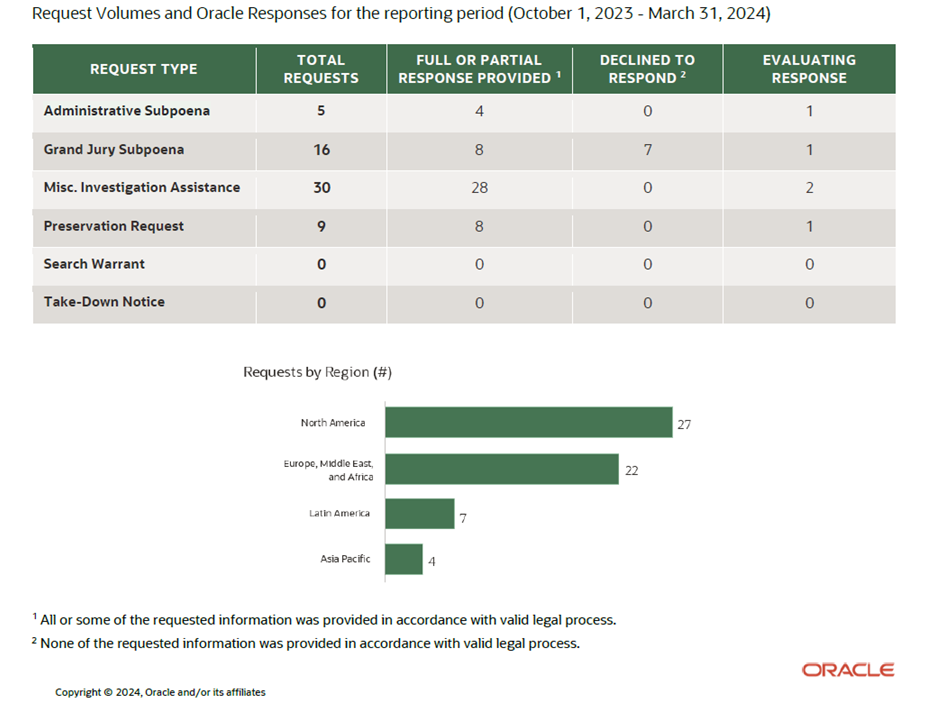
Māori Data Sovereignty Realised?
There are also numerous other Cloud providers in New Zealand who are working with their Māori and Iwi clients (increasingly many have Māori relationship staff roles) and discussing how best to implement Māori Data Sovereignty that recognises Māori organisations own vision of Sovereignty with Iwi, Hapū, marae and Māori Data sovereignty.
Some examples that have appeared in the media this year include: Microsoft deal with Māori to recognise Māori Data Sovereignty and Te Tiriti using their Cloud Sovereignty services, AWS digital Sovereignty, but unfortunately their New Zealand based Data Centre is on hold. However, AWS have recently advertised for a Māori Engagement BDM position where the advert is in partially bilingual. In the same article, we also read about Catalyst Cloud a New Zealand owned and based Cloud provide who use Open Source, employ Māori staff, but are not a Māori company.
We also have a New Zealand government owned data centre being built in Whenuapai, and New Zealand owned Cloud Provider T4 Group who claim they are partially Māori owned.
Spark at Waikato University and T4 Group who are among many other New Zealand based, but not solely New Zealand and or Māori owned Cloud providers.
All of these data centres and others offer to various degrees Māori and New Zealand Data Sovereignty and provide opportunities to realise a Māori sovereign AI and to empower the significant benefits and opportunities to decolonise and empower Māori.
While Māori do not have full sovereignty of these data centres, the Ngāti Toa investment. and a New Zealand 100% Māori owned Cloud company are major leaps of financial partnerships and interests in relation to Māori Data Sovereignty.
We must also consider the hundreds of millions of dollars to build and maintain data centres with infrastructure, security and other resources, then ask if it is best Māori consider the principles of Te Tiriti and work in partnerships with these and other data centres or create our own?
Regardless, Ngāti Toa and Gambarra Kaha are prime examples of Māori and Iwi taking ownership of their own destiny with technology and not waiting around for others to take the lead or trying to follow hypothetical Māori Data Sovereignty governance principles that ignore both tikanga and good data governance, that simply are not able to be implemented by many.
Also of note and an important consideration for Māori and Iwi are that all of the major tech companies are Carbon Zero Certified https://www.toitu.co.nz/our-members
Cloud is where Māori and Iwi should consider investing
Māori AI leaders like Te Hiku Media an iwi-led charitable trust, CEO Peter Lucas, who was recently recognised by the international Times Magazine as one of the world’s top 1000 AI leaders, argues for more sovereignty and that Māori should be the developers and owners of such technology. This is in contradiction to partnering with international cloud providers.
Peter Lucas’ message is significant when considering that Te Hiku Media are the only Māori owned AI organisation with substantial amounts of Māori Data that is used for NLP for reo preservation, and noting that Te Hiku Media are the first public media organisation, RNZ has agreed to supply archival radio broadcasts to support its ground-breaking natural language processing tools, stated https://www.ngataonga.org.nz/news/media-releases/media-collaboration-to-develop-maori-language-tools/
“In doing so we are able to raise to the attention how indigenous communities like the one that I come from, don’t only want to be the users of technology, we want to be the developers of it too. And that way we’re not only just creating tools that serve one purpose.” RNZ
It is not the role of the government, but for Māori leaders, businesses and Iwi to grasp the many potentials of AI and Sovereign Cloud business opportunities and to grow our Māori and Iwi nations and all the myriad of opportunities this will provide.
The potential has significant economic, social, educational and economic benefits if te ao Māori leadership can adapt and recognise these benefits.
Key statistics to consider include:
- Over the last twenty years, around 70 iwi have reached Treaty settlements with the Crown. The settlements total around $2.4b
- Māori economy in June 2022 is about $70 billion.
- A projected growth of 5 percent per annum in the Māori economy is expected to reach $100 billion in assets by 2030.
- In 2020 Te Puni Kōkiri identified more than 10,000 Māori businesses in NZ
- TBD Advisory estimate in 2024, that the most asset rich iwi (Ngāi Tahu, Ngāpuhi, Ngāti Awa, Ngāti Pāhauwera,
Ngati Porou, Ngāti Toa, Ngāti Whātua Ōrākei, Raukawa, Tūhoe and Waikato Tainui) have combined assets of approximately $8.1b, an estimated 69% of all post-settlement iwi assets which they estimate to be $11.8b in total.
Financial research suggests that investing in the Cloud is both commercially strategic as well as recognises that Māori and Iwi sovereignty is no longer physical assets such as land and natural resources, but that data is the new oil and that Data is a taonga to Māori, that Artificial Intelligence is the new electricity compared to oil, thus another taonga for Iwi and Māori economies.
The IDC InfoSnapshot, sponsored by Microsoft, Public Cloud Services Opportunities and Dividends to the Australian and New Zealand Economies, calculates public cloud adoption generated NZ$23.9 billion in new revenues for New Zealand businesses in 2022 – around six per cent of GDP. By 2026, cloud delivery is expected to add NZ$21 billion to the economy above this level and generate 134,000 new jobs as a result of new capabilities and growth. Source:
In the AWS commissioned report by Acccenture “Realising a Cloud-enabled Economy: How Cloud Drives Economic and Societal Impact Through Business it is reported that startups and small and medium sized businesses that embrace cloud-enabled technologies in New Zealand are expected to unlock up to NZ$1.5 billion in annual productivity gains and support 300,000 jobs across the healthcare, education, and agriculture sectors by 2030, representing 9% of total jobs in New Zealand.
In the education sector, cloud-enabled businesses help with addressing the challenge of accessibility and inclusivity of education through digital platforms. The report estimates these can help unlock NZ$430 million in annual productivity benefits in education and provide 400,000 students in New Zealand with e-learning solutions by 2030, which is 33% more than the current usage rate.
In the agriculture sector, cloud-enabled businesses help with addressing food shortage problems, by implementing data-driven practices through cloud technologies such as AI. The report estimates that these businesses in New Zealand can help unlock NZ$430 million in annual productivity benefits in agriculture, and one in three farms will use precision agriculture solutions that enhance productivity by 2030, representing a 190% increase compared to the current usage rate.
Home, hapū, Marae, office-based hosting that offers full Māori Data Sovereignty
It is often thought that organisations must host their data in the Cloud, giving up aspects of sovereignty. This is not entirely true. Organisations such as marae, hapū, iwi and Māori organisations should calculate the risks on investment including issues such as security, resilience and accessibility and consider self hosting from their own locations. Technical experts have been doing this for decades, and it is only recently that it is a lot more accessible to implement with limited technical knowledge and a lot less money.
Block Chain
A blockchain is a decentralized, distributed and public digital ledger that is used to record transactions across many computers so that the record cannot be altered retroactively without the alteration of all subsequent blocks and the consensus of the network.
Block Chain is a strong alternative that reflects Māori and Indigenous views of knowledge and is a decentralised system. There is a Māori owned Block Chain company Āhau .
Storj and a few other start-ups and open source projects are working on blockchain enabled decentralized storage, where you join a global mesh network, other nodes use your own node for redundancy and vice versa.
Hei Whiringa Trust
Hei Whiringa Trust is a collaboration between Māori and Indigenous Peoples who offer a fully sovereign server that can be installed at a price in your marae etc.
DIY alternatives
This section is largely a contribution form a technical expert colleague with international experience who is a senior technical consultant at one of New Zealand’s largest consultancy firms.
The other alternatives to using a third-party hosting provider is to establish a computer at home, marae or where ever you have a fibre internet connection. These options do require a certain level of technical knowledge and maybe between $1,000 to $10,000 in hardware.
There are also many individuals in the community who will assist with their time, with these options if your project or cause is similar.
System Management and Business Software
- CasaOS and Umbrel are currently targeted at people running servers in their home , but inevitably will soon move into small business.
- Open source NextCloud is emerging as a real alternative to Google Drive and OneDrive.
Hardware
- Zima offer pure open source 10gbs 100TB NAS for around NZ $2,000, and you can now build a low power NAS, perfectly fit for purpose for most companies for around $500.
- There’s dozens of other SBC manufacturers, like Libre Computer and BananaPi, offering low cost, low power (hence low carbon) embedded systems, sufficient for most SME applications, e.g. a 10gbps / Wifi 7 router for ~$250. And this is all aside from the upcoming RISC-V revolution.
Storage
- Minio is an open source on-premise alternative to hyperscaler storage. There’s also Seaweedfs.
- IPFS is a new decentralized protocol, easily deployable.
Compute
- Kubernetes has many implementations. Some of them like k3s are very simple and easy to manage.
AI
- ollama, OpenLLM and OpenWebUI allow people and businesses to run large language models on their own computers. Although at this stage the graphics cards required are cost prohibitive ($5k for a 4090 to $20k for an A100), as with all such things, the price will come down over the next few years and be commodified.
Five new categories of Māori Data Sovereignty hosting to consider?
As Cloud technology ever increasingly develops and countries and groups are demanding more sovereignty of their data, there appears to be five new types of Data Sovereignty in New Zealand for Māori to consider, with only one option fully recognising Tino Rangatiratanga or Māori Sovereignty (Category 5 below).
All have numerous and complex benefits and risks that must be considered on a case by case basis, including security and where money is being invested, Māori knowledge being exploited by companies, cultural appropriation etc.
All categories below, in addition are all without exclusion, are also subject to international legal instruments and agreements that the New Zealand government have signed up to including but not limited to the Budapest Convention on Cybercrime, Free Trade Agreements
Category 1: Internationally owned Cloud providers who own software (maybe the hardware too) that is licensed to Iwi and Māori New Zealand owned companies that offers Data sovereignty via encryption. They are fully subject to New Zealand laws, but still subjected to the Cloud Act. Managed by multiple staff.
Category 2: Locally owned NZ companies that licences open-sourced software, offering Data sovereignty, employs Māori staff but no Māori directors (some see this as a Cultural Tax, cultural appropriation or theft and abuse of Māori knowledge, especially where these companies offer Māori Data Sovereignty solutions). They are fully subject to New Zealand laws. Managed by multiple staff.
Category 3: Internationally owned companies, based in New Zealand with their own software and hardware that is offered by the international company to New Zealand and others who employ Māori staff as advisors but not directors (some see this as a Cultural Tax, cultural appropriation or theft and abuse of Māori knowledge, especially where these companies offer Māori Data Sovereignty solutions). They are fully subject to American and New Zealand laws. Managed by multiple staff.
Category 4: Hybrid options that include a mixture of commercial products and Open Source that would likely recognise only New Zealand laws, but could possibly recognise international laws.
Category 5: Self hosted open source options that are fully subject to New Zealand laws only. These can be hosted in private locations. of choice, and managed by whom ever the community/individual(s) decide. This option does not require to be connected to the Internet, offering greater security and sovereignty than any cloud options.
But is a Māori Sovereign Data Centre realistic?
Amazon Web Services had planned a budget of NZ$7.5 billion to create a NZ data centre and Microsoft spent $180M just on land for a data centre according to https://www.reseller.co.nz/article/1299691/microsoft-consented-to-buy-land-for-180m-nz-data-center-build.html. Putting that into perspective, I note that the entire NZ health budget for 2024 is $5.720 billion. Just under 2 billion dollars less than AWS proposed to invest.
The reality of creating a Māori Sovereign Data Centre must be carefully considered. New Zealand has a population of 5 million people and Māori make up 18% of the population. Māori and Iwi contribute more than $70 billion to the economy. Considering we already have an abundance of Data centres in NZ, it would seem feasible that Māori and Iwi invest in Data Centres and local companies who have international infrastructure and local infrastructure, who can offer sovereignty Cloud solutions.
Māori society have many other considerations that come first before data hosting, including social, health, racism, equality, equity, human rights, te Tiriti and many other wicked problems that perhaps analysts and Data Scientists could argue are equally as important.
Until Māori and Iwi can realise and benefit from investing in sovereign data centres and AI that will assist Te Ao Māori, data and AI will likely not be a priority.
It appears to me, that if international companies are investing multi millions of dollars into data centres in New Zealand, then this must be a good investment for those with the substantial amount of money required to invest. Equally important is ensuring that these conglomerates are Carbon Neutral to protect our environment and that they work with Māori and Iwi to recognise both Aotearoa New Zealand and Māori Sovereignty, including tikanga Māori as stipulated in the Ellis case at the Supreme Court where tikanga Māori is a part of Aotearoa New Zealand common law.
It is important that Māori and Iwi who pay for data storage to external corporates, to act in kotahitanga and use their collective bargaining powers to tell and negotiate with international conglomerates and locally owned Cloud providers, to recognise Te Tiriti, rangatiratanga and mana motuhake with Māori and Iwi data. Collectively as a significant player in the New Zealand economy, this is reasonable and what any good business would do.
Another avenue would be for Māori and Iwi to invest with international Indigenous Peoples communities and groups who are also asking the same questions and seeking an unique Indigenous Peoples solution.
Conclusion
The Indigenous Trans Tasman Gambarra Kaha (NZ) company and the Ngāti Toa acquisition gives Māori, hapū, iwi and hāpori Māori yet another option for hosting their data in an environment that meets many of the Te Tiriti based Māori Data Sovereignty principles. It could lead the way for other Iwi and Māori organisations to invest in Cloud Sovereign hosting allowing Māori and Iwi to become more sovereign of their data and to ensure that our Māori Data is kept onshore and will likely see the repatriation of Māori Data be a common discussion with repatriation of other taonga.
The shift from academic hypotheses and obfuscation of te Ao Māori views and Data governance (or lack of) in the Māori Data Sovereignty space will now with many Māori and iwi in the market and many New Zealand options for hosting, open many new opportunities for Māori Data Governance experts who can specialise in te Ao Māori and Indigenous views. This in turn will create new jobs and new opportunities for iwi, marae and hapū and contribute back to the New Zealand and Māori economy.
The tens of millions of dollars to invest in a durable and internationally robust cloud host provider could/should be invested in other leading issues that impact Māori, or with investing in current solutions. We have a government data centre being built, Māori and Iwi should be negotiating an Aotearoa New Zealand and Māori Sovereign data centre.
If Māori and Iwi are going to pay a Cloud Data Provider to host their data, they must ensure that the companies are genuinely committed to Te Tiriti, Te Ao Māori and do not contribute to the growing trend of culturally taxing their Māori staff who are often young people.
Iwi and Māori should calculate the risks to your organisation and your data with legislation and possible future repatriations of data when deciding to self host. The financial analysis must be asked by Māori and Iwi as to if it is financially and technically viable to create a new Māori Sovereign Data Centre, or to continue to work in partnerships that reflect Te Tiriti and Māori and Iwi financial and long-term aspirations.
Māori and Iwi need to consider that they are still not able to regain full sovereignty of land and other natural resources, then aiming for full Māori sovereignty of data centres is perhaps a dream full of risks with such a diverse societal and cultural group needs.


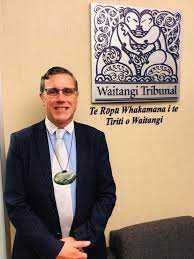
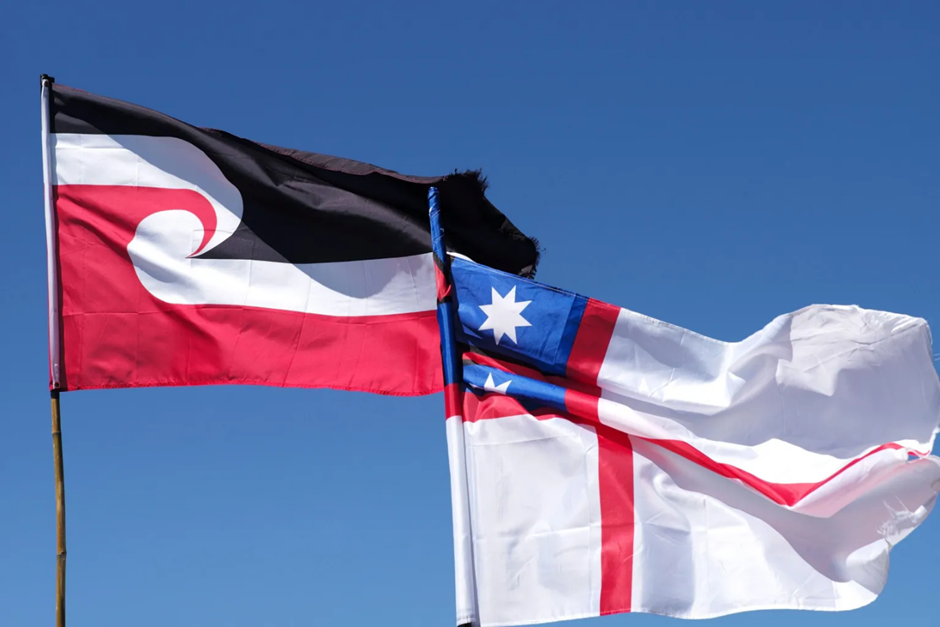


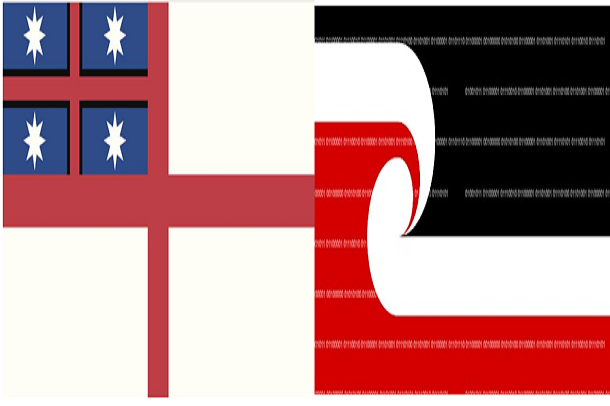
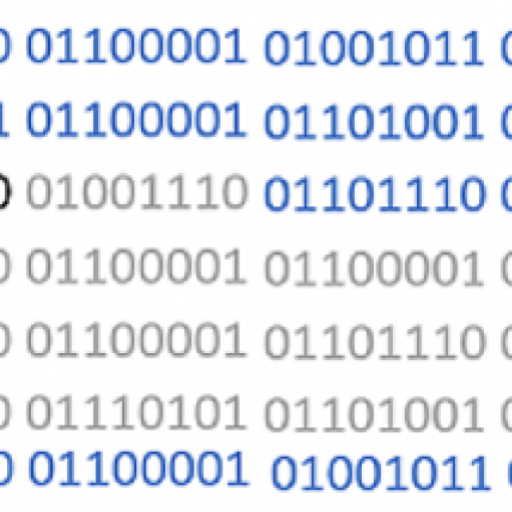
Leave a Reply
You must be logged in to post a comment.